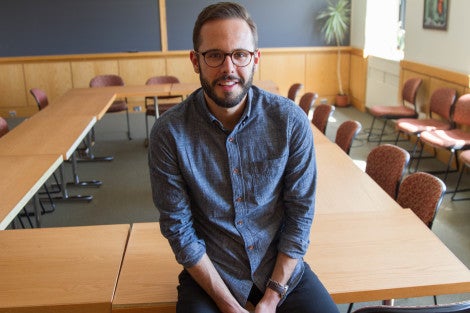June 3, 2015 — It’s not every day that a lecture changes a life. But that’s what happened with Benjamin Picillo, MPH ’15, as an undergraduate at Tufts University. “I had always wanted to help people, and I thought I wanted to do that by being a doctor,” he said. “But one day I went to a presentation by the head of the Community Health Program at Tufts, and I was completely captivated. She talked about how poverty and health are intertwined, how people’s health—and in turn their livelihoods—are affected by where they live, their access to educational and economic opportunities, health care, safe housing, healthy food, and green space. This way of thinking about the world was completely new to me.” That was the moment Picillo decided to carve out a new path, one that would eventually lead him to Harvard T.H. Chan School of Public Health.
Picillo spent a semester studying international development and global health in Geneva, Switzerland, and went on to work in global public health after graduating from Tufts, primarily on HIV/AIDS and maternal health projects in several countries in Sub-Saharan Africa. One project in Nigeria focused on developing a national health care quality strategy for improving the country’s health systems. This project sparked Picillo’s interest in working to understand and improve the health systems in developing countries that so often fail to provide essential services to those who need them most.
In meetings with various actors across the Nigerian government, private sector, and civil society organizations, he often heard similar frustrations about the difficulties in delivering high-quality, safe, and efficient care because of lack of financial resources, lack of health workers, weak management practices, and patient distrust of the health system.
“I realized that even when disparate parts of the health care system may appear to have different motivations,” said Picillo, “system-wide improvements, such as policies to remove financial barriers to care, could help a great number of organizations and actors throughout the system deliver better care and increase access.”
Armed with a strong background in project implementation, Picillo came to Harvard Chan School to bolster his analytical and research skills. He calls his time at the School “transformational,” as it allowed him to gain deeper knowledge in a variety of fields that contribute to improving health care, including economics, evaluation, strategy, and policy analysis. He is especially interested in the role of the private sector in the delivery of health care in low- and middle-income countries. “The private sector already plays such a major role in providing health care,” he said, “yet there’s a sense that the public and private sectors are diametrically opposed to one another. In reality, there are synergies that could greatly improve health care in countries around the world.”
To learn more about these synergies, Picillo was involved in Project Antares, a joint program of Harvard Chan School and Harvard Business School, where he worked on a project with an Indian pharmaceutical company to create improved distribution models for a dengue vaccine currently under development.
With a degree in hand from Harvard Chan School, Picillo hopes to work closely with government and nongovernmental bodies to create strategies for achieving a specific goal, such as improving the quality of care in public hospitals. He also aims to investigate innovative delivery models and financing structures to help expand health care’s reach and improve quality of care. “There’s a lot of focus and excitement around this field right now, including within the School, especially given the global push for universal health coverage,” he said. “I feel that system-level approaches can have a great impact on improving health care for millions of people.”
photo: Emily Cuccarese
